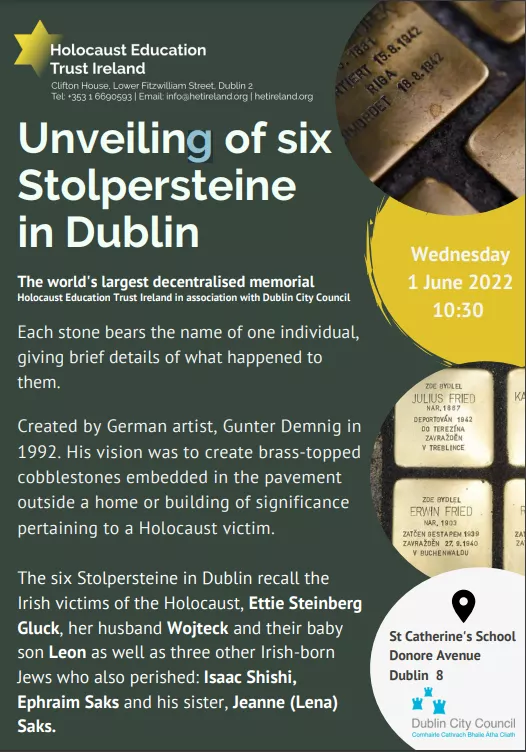Irish Holocaust victims commemorated
Published on 1st June 2022
Six Stolpersteine ‘stumbling stones’ were unveiled by Holocaust Education Ireland and Dublin City Council today to remember each of the Irish citizens who were victims of the Holocaust. The unveiling took place at a commemorative event at St. Catherine’s National School in Dublin 8.
Speaking at the event, Councillor Mary Callaghan, representing the Lord Mayor of Dublin Alison Gilliland, added: “The Stolpersteine Project is the largest de-centralised memorial in the world with more than 90,000 memorial stumble stones in 27 countries around the world. We are proud that Dublin City is now part of this ever-growing remembrance project.”

The six victims of the Holocaust who were remembered today are:
• Esther (Ettie) Steinberg – Esther was born in Czechoslovakia in 1914. Her family came to Ireland in 1925 and lived in Raymond Terrace off South Circular Road in Dublin. Ettie attended St Catherine’s School in Donore Avenue, and afterwards, worked as a seamstress.
• Wojteck Gluck – Wojteck was a goldsmith from Belgium and the husband of Esther. They married in 1937 in Greenville Hall Synagogue, Dublin.
• Leon Gluck – Leon was the son of Esther and Wojteck. The family moved several times, ending up in Toulouse in 1942. It was there that they were arrested and deported to Auschwitz where they were murdered in gas chambers.
• Isaac Shishi – Isaac was born in Dublin in 1891. His family originated from Lithuania. They lived on the South Circular Road. In 1941, Isaac Shishi, an Irish citizen, his wife Chana and their daughter Sheine, were murdered by the Nazis in Vieksenai, Lithuania.
• Brother and sister, Ephraim and Jeanne (Lena) Saks - Ephraim Saks was born in Dublin in 1915 and his sister, Jeanne, in 1918. They lived in St Alban’s Road in Dublin 8. During the Second World War, while living abroad they were both arrested and deported to Auschwitz where they were murdered.
Also commenting, Chairperson of Holocaust Education Ireland Thomas O’ Dowd, said: “Holocaust Education Ireland aims to educate and inform people about the Holocaust. What more fitting project of remembrance could we have than embedding these six Stolpersteine today in memory of Irish victims of the Holocaust?
“It is appropriate that the Stolpersteine are located in Dublin 8, as the area became a home for Jewish people fleeing antisemitism in the Russian Empire. We hope the Stolpersteine help to educate and inform people about the Holocaust.”
The Minister for Children, Equality, Disability, Integration and Youth, Roderic O'Gorman TD, said: “My Department is very pleased to support the unveiling of the Stolpersteine to remember the Irish victims of the Holocaust. This meaningful memorial will allow these stories to pass through generations and will let us bear witness to their personal experiences of the Holocaust. The Stolpersteine at St. Catherine’s National School will play an important role in helping us to remember the Irish Holocaust victims and to reflect on the ideologies and events that led to the loss of so many lives.”
The Stolpersteine Project
Stolpersteine (stumbling stones) is a project of the artist Gunter Demnig. The project commemorates people who were persecuted by the Nazis between 1933 and 1945. Gunter Demnig attended the commemoration today along with the German Ambassador to Ireland Dr. Cord Meier-Klodt.
There are over 90,000 Stolpersteine in 27 countries: Germany, Austria, Belgium, Croatia, the Czech Republic, Denmark, Finland, France, Greece, Ireland, Italy, Hungary, Lithuania, Luxembourg, Moldova, the Netherlands, Norway, Poland, Romania, Russia, Slovakia, Slovenia, Spain, Switzerland, Ukraine and the United Kingdom.
The embedding of the Stolpersteine at St. Catherine’s National School has been supported by Dublin City Council and in cooperation with the Embassy of the Federal Republic of Germany, Dublin.
Holocaust Education Ireland
Holocaust Education Ireland is an independent and non-profit charity which informs about the Holocaust and its consequences. Programmes and educational materials are carefully structured to raise awareness about prejudice, discrimination, hate speech, misinformation, denial and distortion of the Holocaust. Holocaust Education Ireland is committed to historical truth and accuracy and works closely with government, educators, intercultural bodies and community groups.